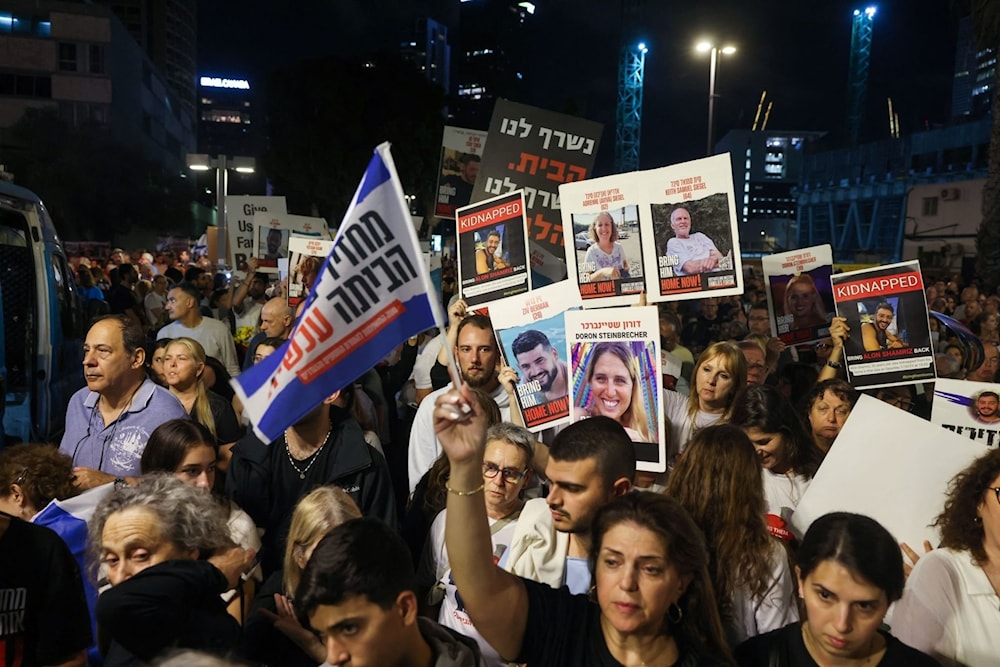Hamas refutes claims that it reached prisoner swap deal with 'Israel'
A member of Hamas' Political Bureau refutes claims attributed to the movement that a prisoner exchange deal has been reached with the Israeli occupation.
-

Israeli protestors rally in "Tel Aviv" demanding that their government secure the release of Israeli captives in Gaza, in occupied Palestine, on November 18, 2023. (AFP)
Izzat al-Rasheq, a member of Hamas' Political Bureau, refuted claims that the movement had reached a prisoners exchange deal that was alleged to commence on Monday.
In a similar context, Israeli officials took part in a meeting of the war cabinet late on Sunday. The meeting's agenda focused on the exploration of a prisoner exchange deal with the Palestinian Resistance. However, Israeli officials informed on the matter said that "no deal has yet been reached," as they pointed to progress in mediated negotiations.
Israeli media reported that discussions on the ceasefire "are certainly progressing but will take time." According to Israeli media outlets, a suggested deal would see 50 non-military Israeli captives return to occupied Palestinian territories in exchange for 50 Palestinian detainees held by "Israel", that solely include women and children.
Earlier on Sunday, Al Mayadeen's sources revealed that a final formula for a ceasefire fulfilled all the conditions set by Hamas during negotiations.
Informed sources indicating that the Palestinian Resistance movement expressed its readiness to release the Israeli settlers held captives since the beginning of Operation Al-Aqsa Flood while emphasizing the fact that the Israeli side is delaying the implementation of the deal to this point.
According to the sources, Hamas had stipulated the release of Palestinian women and children in Israeli occupation prisons in exchange for the release of dozens of settlers held captives in Gaza.
The sources indicated that in order to secure the release of these Israeli captives, Hamas requested a five-day ceasefire, with the provision of a secure environment and a halt to the movement of Israeli drones over the Gaza Strip.
The Resistance also demanded that aid enter both the southern and northern parts of the Gaza Strip rather than only the South, where humanitarian aid trucks were allowed to enter in the past weeks through the Rafah Crossing.
The Resistance holds its ground during negotiations
In a related context, Axios cited three informed sources that negotiations for the release of Israeli captives held in the Gaza Strip "are back on and showing modest progress after a pause lasting several days."
The sources mentioned that the head of Hamas in Gaza, Yahya Sinwar, had halted contact with the movement's representatives in Doha after the Israeli occupation forces stormed al-Shifa Hospital.
However, Sinwar resumed contact in the past 24 hours, sending a new response to Qatari mediators, indicating that the two parties have come closer, but the current stage of talks is not enough to reach an agreement, the sources revealed.
Axios cited two sources as saying that the specifics of the agreement are still being worked out, and there are daily alterations to its details.
"Sometimes there are changes every hour," one source was quoted as saying.
According to the sources, if reached, the agreement would be implemented in two stages: the first involves the release of about 50 women and children held by Hamas in exchange for a five-day ceasefire. As for the second stage, it includes locating more women and children captives held by other Palestinian Resistance factions to release them, with this process taking place during the five-day ceasefire.
Two of the sources told Axios that Sinwar has tentatively agreed to expand the number of women and children to be released under the two-stage deal, surpassing the initially agreed-upon 50.
However, the sources noted that the head of Hamas in Gaza insists that, during the ceasefire, "Israel" ceases its aerial surveillance of Gaza for six hours daily to enable Hamas to safely locate captives.
Additionally, Sinwar demanded the release of all Palestinian women and children held in Israeli occupation prisons.
Axios also mentioned that a point of contention is the number of aid trucks allowed to enter Gaza from Egypt daily under the agreement. Hamas is insisting on the entry of 400 trucks per day, with these trucks supplying not only humanitarian goods but also fuel for hospitals and bakeries. However, the Israeli occupation claims that the Rafah Crossing cannot handle 400 trucks daily for alleged "security reasons".
Read more: Biden Deputy NatSec Adviser says captives deal 'closer than ever': CNN

 4 Min Read
4 Min Read








